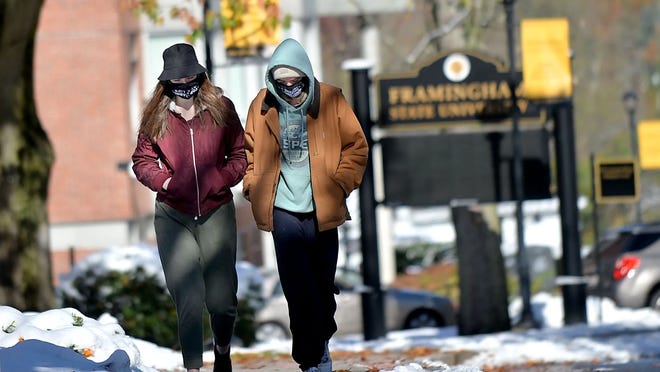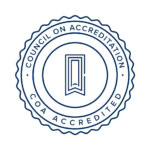Framingham State, MassBay part of new state pilot to support homeless teen

This story originally appeared in the MetroWest Daily News on Jan. 10, 2021
FRAMINGHAM — A new government-funded scholarship program will provide dorm beds, meal plans and case management to homeless teens who enroll at Framingham State University or Massachusetts Bay Community College.
Set to begin next fall, the “Moving to College” pilot is a continuation of another state effort, the Massachusetts Student Housing Security Pilot, launched in 2018. The difference between the programs is school officials will target homeless students who have just graduated high school, as opposed to those who’ve been in college for several years.
It means struggling students will get a “warm hand-off from high school to college,” said MassBay President David Podell.
“Sometimes, you receive services in high school and you come to college and it’s a whole new ballgame,” said Podell. “This program means that we have adjusted both the housing issue and the food issue, and connected services to make sure these students get to college and succeed.”
Scholarships for up to 20 incoming students will cover their housing expenses over four years of school. Those will be funded through the U.S. Department of Housing and Urban Development, marking the first time Massachusetts has chosen to use those dollars to support college students.
As part of the arrangement, Framingham State and MassBay will cover meal plans as well as provide case management and other services.
Higher Education Commissioner Carlos Santiago said the push to support homeless students began when the state examined data and realized a growing need.
“All of this is relatively new to us. This is not something most colleges do. The highest priority is to educate students and move them along, but it was pretty clear to us that students were facing significant needs that went beyond the typical tuition and books,” said Santiago.
According to state data, there were at least 24,071 homeless children and youth enrolled in Massachusetts’ public schools during the 2017-18 school year. During the 2016-17 school year, 2,959 students fewer were counted. Most officials agree the numbers are an undercount, as homeless youth tend to be a transient population and can be difficult to survey.
With the pandemic and economic recession having caused some students to drop out or never apply, Podell said the “challenges will only be greater.”
Santiago said state officials will be looking for insight on how to best help high school students move into a college environment.
“We want this to be a program that helps these student transition and gives them the kinds of answers they need to succeed,” said Santiago.
In addition to MassBay and Framingham State, other participating institutions are: Fitchburg State University; Mount Wachusett Community College; Berkshire Community College; Massachusetts College of Liberal Arts; North Shore Community College; and Salem State University.
Students who are registered at a community college will live at the nearest participating state university campus and commute to classes or take classes online.
Each regional team will be comprised of campus staff from four-year and two-year campuses working in partnership with school liaisons and counselors and a local non-profit youth services provider.
For MassBay and Framingham State, that youth services provider will be Wayside Youth and Family Support Network. Together, they’ll function as a partnership to form a triage of support for students.
Both schools are also taking part in the first program, the Student Housing Security Pilot. Kay Kastner, coordinator of student support initiatives at Framingham State, said with that participation, the university learned that these students are usually facing a storm of problems at the same time. It varies from financial issues to mental health struggles.
“It’s multi-layered,” said Kastner. “With those students, during the in-take process, we take care of the most acute problems first so they can be in a more secure situation where they can deal with one thing at one time.”
Scholarships will not cover tuition, fees, books, supplies and transportation. However, Kastner noted, students will have access to many services, such as the campus’s food pantry and mental health counseling.
Framingham State University President Javier Cevallos is “delighted” with the program expansion.
“A college degree changes lives,” he said. “We know the difference between a high school diploma and a college degree is about $1 million of earnings over a lifetime. Not to mention the opportunities they will have with a college degree for different types of employment are much better.”
Currently, school officials are working to identify students who could benefit from the program.
“That’s easier said than done,” said Katy Abel, associate commissioner for external affairs and special projects in the state Department of Higher Education. “Everything is remote right now, and we’re finding a lot of students are dropping out of being in touch with teachers because they don’t like remote learning … we’re swimming upstream in that regard.”
To qualify, students must meet a slew of requirements, including proving that they are homeless. They must be a U.S. citizen or a permanent resident, because the scholarship is funded with federal dollars.
When in school, the student needs to maintain full-time enrollment (12 or more credits) and maintain passing grades to be eligible for a renewed scholarship. In the summer, they need to either remain enrolled in at least two courses during the summer terms, work full-time, or enroll in one course and work part-time.
Applications are due by March 1. More information is available on the state Department of Elementary and Secondary Education’s website.

